International shipping, in simple terms, refers to the transfer of goods across borders via either land, air, or water.
The birth of the modern international shipping and logistics industry can be traced back to the industrial revolution at the turn of the 19th century. The development of the steam engine and the switch to mechanical production methods led to unprecedented growth in global production, increased incomes, higher consumption, and paved the way for globalization.
We now find ourselves in an age of consumerism, where no one country has all the resources and raw materials it needs to match growing domestic demand. Some countries, find themselves with an abundance of resources and not enough demand for them. This gap forms the foundation of global trade and gives rise to the demand for international shipping of goods.
Additionally, many businesses in countries all over the world have now expanded to serve international markets and need to transport their goods overseas, at times to multiple destinations, to meet their international demand.
Over time, countries have come to rely heavily on their imports and exports for continued economic development and prosperity. Likewise, success for businesses operating in multiple markets is predicated on their ability to efficiently send and receive goods from one country to another. The international shipping and logistics industry is, therefore, the backbone of the global economy.
The international shipping process
A business that is looking to send its goods overseas, either on its own or through an international shipping company, should have an understanding of how the international shipping process works. Unlike domestic shipping, which merely concerns the transport of goods from a source location to a destination, both of which are within the same country, international shipping is much more complex. It involves several stakeholders including the businesses that own the goods, international shipping companies, customs authorities, the final consumer, etc.
There are also several stages that goods have to pass through to reach the intended customer. Let’s take a closer look at these stages.


- Export haulage
The first step in international shipping is export haulage which refers to the transfer of goods from the premises of the consignor to that of the forwarder. In the case of less-than-container-load (LCL) shipments, the goods first move to a warehouse or handling facility belonging to the freight forwarder/international shipping company where they are packaged in a consignment consisting of various goods from multiple shippers. It is then transported to the port storage facility. On the other hand, full-container-load (FCL) shipments are directly moved from the location of the shipper to the port facility or warehouse of the forwarder.
- Export customs clearance shipping
The next step is where custom authorities of the origin country come into the picture. Cargo shipments that are on their way out of a country have to first pass custom checks, meet export regulations, and receive clearance before they can be shipped out. International shipping companies and freight forwarders with a customs license are responsible for declaring all the goods being shipped, compiling all the relevant documents, and submitting them in time to the authorities. This process is a must and cannot be completed by companies that don’t have a license.
Businesses, therefore, either have to outsource their shipping to an international shipping company or hire a customs house broker. A customs house broker is a customs license-bearing entity that assists businesses and freight forwarders with the customs clearance process.
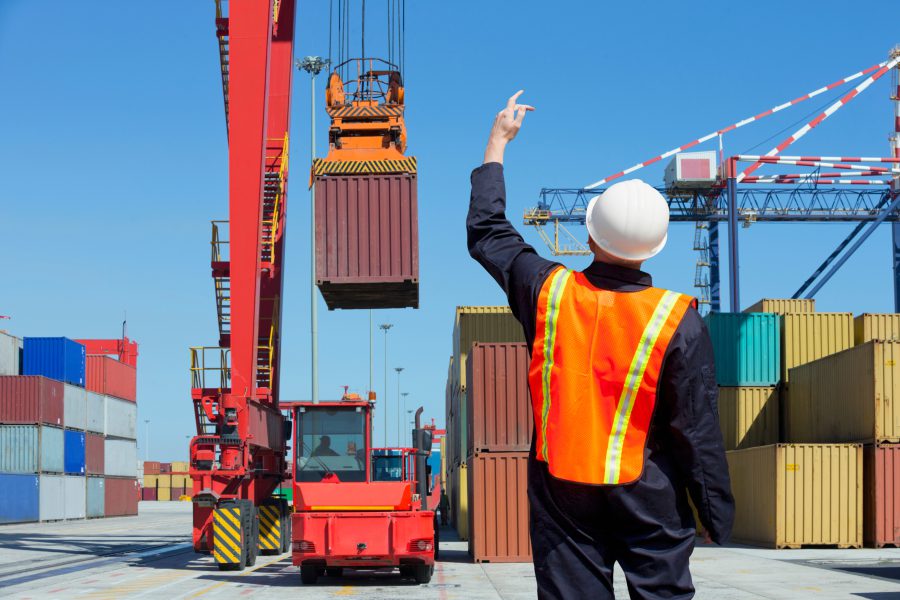

- Origin handling
In between receiving clearance from customs authorities and the cargo shipment leaving the country of origin, the international shipping company in charge of the consignment is responsible for checking the goods. The international shipping company needs to ensure the safety of the goods, tracking their movement to the port, packing the cargo into containers, and finally loading the containers in a truck, marine vessel, or airplane–depending on the method of transportation is being used.
While it is the forwarder that takes care of origin handling, the costs are not necessarily borne by the shipper. In case of a Free on Board (FOB) shipping point contract, the consignee pays for the costs of origin handling and in case of a FOB destination contract, the shipper takes care of all the costs until the cargo is delivered to the destination port or location of the consignee.
- International transportation
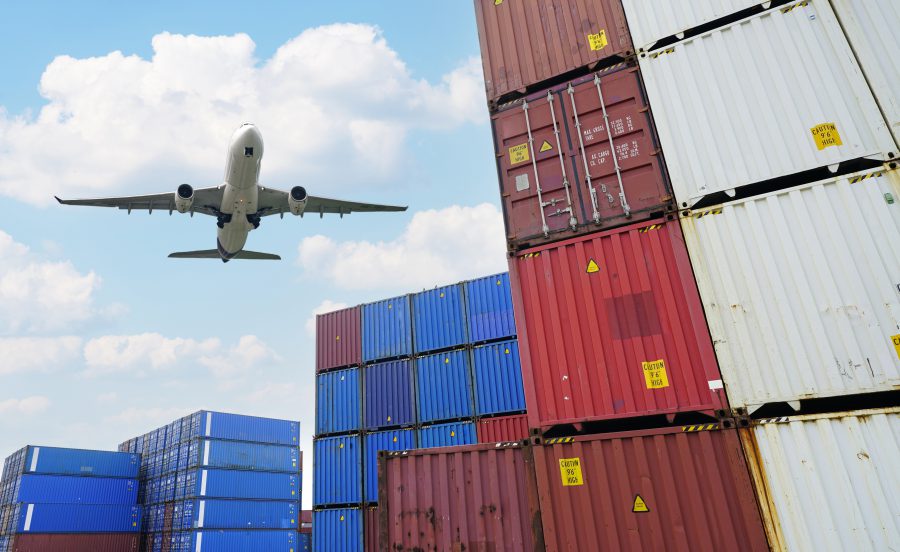

After successfully clearing customs and origin handling, the goods are sent on their way to the destination country. Depending on the size and quantity of the freight and the delivery time promised to the customer, a business can choose to ship their goods either via air, sea, or road. The cost of transportation is passed on either to the shipper or the consignee.
- Import customs clearance
A shipment also needs import customs clearance by the customs authorities of the destination country. The process of declaring the goods, submitting relevant documents, and receiving clearance are once again undertaken by the international shipping company that either has its own customs license or hires a customs broker/agent.
The process of getting import customs clearance can be initiated before the goods leave for the destination country. In any case, the goods cannot leave the port facility until the clearance is received.
- Destination handling company
Similar to origin handling, destination handling is taken care of by the international freight forwarding company. Before the goods can be released to the consignee, they need to be unloaded, checked, moved to the warehouse or storage facility of the forwarder, and then loaded onto delivery trucks, all while ensuring the safety of the cargo.
- Import haulage company
This is the last leg of the international shipping process and concerns the delivery of goods from the warehouse of the international shipping company to the address of the consignee. Some international shipping companies provide import haulage services themselves while others choose to outsource to an agent/external delivery service.
Selecting an international transportation method
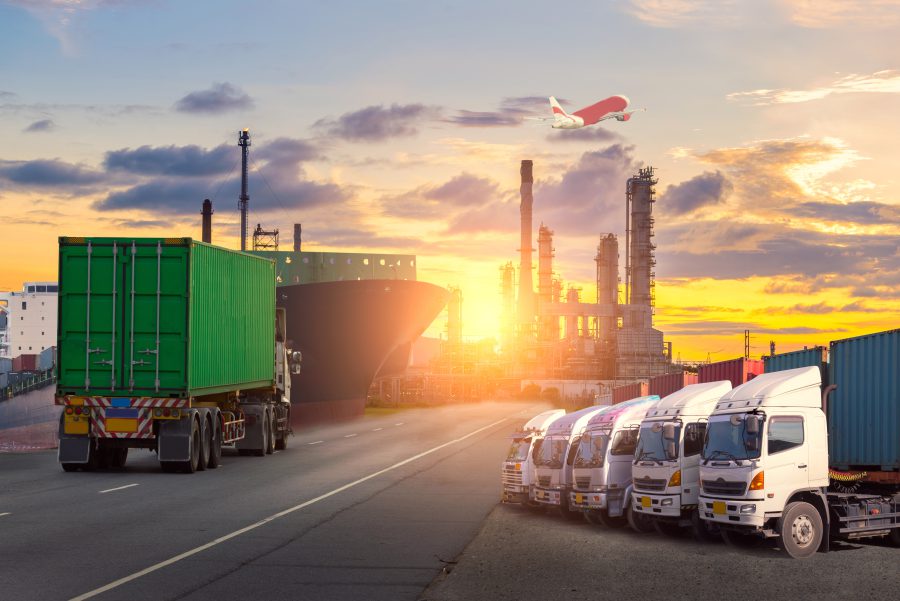

- Airfreight: Another term for air cargo, air freight refers to the transportation of goods through air carriers. Almost every airline in the world today operates a cargo division that focuses on handling and managing air cargo shipments.
There are several benefits to shipping through air freight. It is the fastest mode of shipping and has a global reach, meaning you can ship your goods anywhere in the world within hours. The chances of damage are minimum, and, in most cases, you can track your shipments in real-time. These advantages make air freight the preferred mode of international shipping for perishable goods and items that need to be delivered within a short period.
However, there are certain drawbacks to shipping by air. Air transport is much more expensive than moving goods via sea and land. It is also not possible to send big, heavy shipments via air. Airplanes have limited capacity and can only bear a certain amount of weight. Transportation of heavy machinery, raw materials, automobiles, etc., is therefore mostly done via sea or road.
- Sea freight:
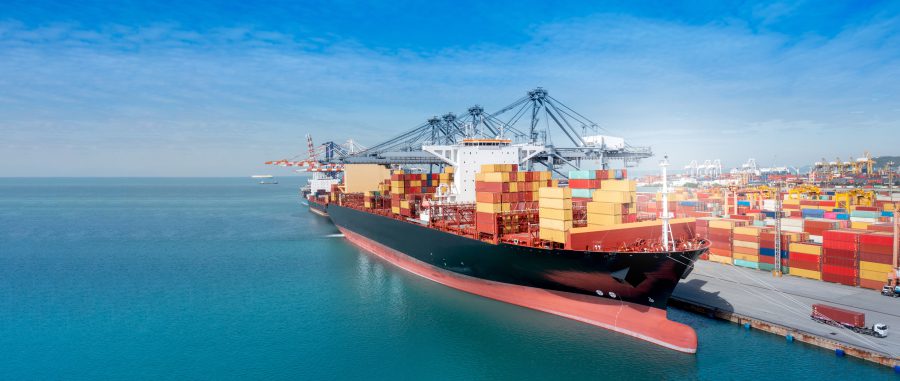

Sea freight refers to the transportation of goods on marine vessels and container ships. It has been reported that around 80% of global trade is done through maritime shipping, making it the most popular of the three modes of international shipping.
The importance of sea freight in turning the wheels of global economic activity was recently put on display when the Ever Given, one of the largest container ships in the world, blocked the Suez Canal for six days. It led to a loss of billions of dollars each day, caused oil prices to rocket, and disrupted global supply chains, leaving the international shipping industry in mayhem.
It is easy to see why sea freight is the preferred mode of transportation as it is by far the cheapest option out of the three. Marine shipping vessels are not as limited by space as their road and air counterparts and are capable of transporting bulky and large cargo shipments. Compared to aircraft and trucks, shipping vessels are also more eco-friendly since they don’t use as much petroleum and leave a smaller carbon trail. If your business is environmentally conscious, you may want to opt for maritime shipping.
However, if you are on a strict schedule, you may want to avoid shipping by sea. Container ships are much slower and have to cover long distances. Additionally, sea freight is more likely to encounter delays on part of the complex underlying procedure of getting ships loaded, checked, and ready for departure before every journey.
- Land freight: The transportation of goods via trucks or railways is known as land freight and is mostly used for short-distance cargo transportation. Land freight comes with its fair share of advantages. It’s cheaper than air freight, quicker than sea freight, and can be used to transport to less accessible areas. It is also a more flexible mode of shipment and services more routes.
Conversely, land freight is not suitable for transportation over longer distances. Unless land routes between the origin and destination countries are available and well-developed, long-haul road freight is avoided. It is also more susceptible to delays caused by vehicle accidents and breakdowns.
Outsourcing your international shipping needs


Regardless of the transportation method you choose, there is a considerable amount of work that goes into ensuring the successful international shipping of goods. If it wants to make timely deliveries to its customers, a business must carry out each step in the international shipping process outlined in this article efficiently, and doing so can end up taking a significant amount of time that most business owners can’t afford to spare. A business looking for success in an international market needs to focus on its core competencies—the territory, ensuring product quality, and providing premium customer service, etc., rather than worrying about the transportation of its goods.
Most businesses, therefore, choose to outsource their international shipping operations to international shipping companies that specialize in different or, in some cases, all aspects of the shipping process. International shipping companies are the bridge between the shipper and the entire shipping industry.
Here are the top three benefits your business can accrue by hiring an international company:
- Time and cost efficiency: Handling international shipping is a cumbersome process that involves dealing with various stakeholders and taking care of several things including warehousing, loading/off-loading, customs clearance, packaging, etc. This takes time and if not done with the utmost efficiency, can also end up costing businesses a lot more than they bargained for. Outsourcing the entire process to an international shipping company ends up saving a lot of time and energy.
These companies specialize in handling the shipping needs of businesses, know the ins and outs of the industry, have a wide industry network at their disposal, and are focused on improving the efficiency of international shipping. This puts them in a unique position to negotiate the best prices with transport operators, storage providers, delivery service providers, etc. This ensures cost-efficiency which the business can pass on to their customers and position themselves to gain higher market shares.
- Reduced risk of disruptions:


If there’s one thing that a consumer despises more than anything, it’s late deliveries. Businesses, therefore, strive to deliver on time. However, disruptions are bound to occur in international shipping, especially if customs regulations are not carefully followed.
A good international shipping company makes it a priority to follow and stay up to date on different customs laws of different countries. This allows them to go through the customs clearance stages quickly and smoothly. They are also better equipped and more experienced in dealing with disruptions that may occur at any stage of the process.
- A one-stop-shop: International shipping companies often provide an all-encompassing solution to a business’s international shipping They connect you with airlines, shipping liners, trucking companies, and customs brokers/agents. They also often provide a wide array of services including packaging, warehousing, and, in some cases, even delivery services. As a result, businesses are provided with a hassle-free international shipping experience.,.
Choosing The Right International Shipping Company For Your Business
The international shipping and logistics industry is massive and there are many companies you can choose from. The kind of international shipping company you employ will eventually depend on the size, scale, and specifics of your organization and product. This means that you first need to define your needs and requirements – the types of services you would like to have, the modes of transportation you want, and the average volume of shipments you expect. This information is crucial in helping you decide on a third-party logistics provider(3PL) and the forwarder’s ability to judge if they can do the job for you.
Listed below is a checklist of criteria you need to keep in mind when choosing the right int



ernational shipping partner:
- Make an accurate assessment of your shipping needs
Before starting on a search for an international shipping company you need to determine your exact requirements for a streamlined supply chain–where are your gaps and inefficiencies?
- Industry experience and area of expertise
It pays to be mindful of the fact that not all international shipping companies cater to everything, but rather have specialized areas of expertise. This can include transportation, warehousing, distribution, shipping, and receiving, or a combination of one or two of the services. If you are a smaller enterprise that is looking for support across a specific area of your business, you need to find a supplier who matches your needs with the correct kind of capabilities.
- Company financial security and sustainability


A shipping company’s financial standing and sustainability have a direct impact on your business. It is not uncommon for business partnerships to begin in good faith and later suffer due to poor revenue models. Before taking on an outside shipping company, examine their financial background thoroughly.
- Company credibility
Credibility is crucial if you want to build a long-term shipping partnership. To find a credible international shipping company, you have to investigate their industry and market reputation amongst customers, suppliers, and business partners. Have they consistently honored their business commitments and met expectations? Go through customer reviews, testimonials, and market feedback to ascertain how clients feel about them. Reach out into the industry through your resources and get evaluations of their services.
- Company network and reach capabilities
When considering partnering with an international shipping company, two of the obvious factors that you need to keep in mind is their network and reach capabilities. For the partnership to work, the shipping company must not only operate in the regions where you have demand but also in areas and territories that you plan to grow into. A 3PL or 4PL with a wide range of contacts has the additional advantage of helping your business grow into geographically diverse areas. They can act as endorsers and advocates for your services, helping you gain further validity and support.
- Customer service and support


In the fast-paced world of business, a company wants its problems addressed and questions answered on a priority basis. When a shipping company is not able to deliver on that front, it can make for a very frustrating partnership and be a cause for broken agreements.
- Company safety records
Shipping services are a sum of many moving parts that have to operate in perfect unison to ensure that everything goes smoothly. For this to happen your international shipping partner must have a proven safety management record and optimal facilities.
- Technology
Modern-day shipping has gone digital. That means your company’s supply chain data should be at your fingertips–at all times. This kind of transparency is non-negotiable in this day and age. A professional international shipping company, therefore, must be equipped with the latest technology innovations to offer transparency and efficiency.
- Company pricing
Before you decide on a shipping company you need to be asking yourself if their pricing is transparent or are there any hidden charges? The price charged by an international shipping company is a key metric for you to consider.
SBT is the Kingdom’s leading transportation, warehousing, and logistics service provider. Get in touch with us to find out more about how you can choose the right international shipping company to meet your shipping requirements.
Summary
With rising customer expectations and intense competition in the market, businesses around the world have turned to third-party logistics (3PL) providers to professionalize their supply chain management.
Business managers understand that 3PL and 4PL providers allow them to tap into more sophisticated supply chain resources, such as the latest operations technology to support increasingly complex logistics operations.
By eliminating the need to invest in transportation and warehouse rent, equipment and personnel, and in taking over the entire supply chain operations, from billing and auditing to staffing and training, a 3PL and 4PL provider cuts an entire department’s expenditures from the operational costs of a business. Additionally, due to their expertise, 3PL and 4PL providers also improve the efficiency of your supply chain, allowing your business to develop a robust logistical network with higher returns and lower risks.
When 3PL and 4PL vendors are not efficient, businesses end up hiring extra manpower to compensate for the shortfall, which ultimately increases labor costs. Apart from wasted monetary resources, a poor 3PL and 4PL vendor will also cost your business time and thus, potential money. On the other hand, if your 3PL and 4PL vendor was delivering an efficient end-to-end supply chain, your business would produce inventory in the required amounts and quickly ship to customers in the correct timeframe and quantities.
With an increasingly digitized business environment, vendors are expected to be able to provide real-time status updates about shipments, order tracking and the availability of inventory at warehouses. Moreover, a major function outsourced to a 3PL and 4PL vendor is inventory control. Remember that when this is compromised, several business outcomes are adversely impacted.
Index
- Your logistics costs will be higher than the industry average for your business volume
- Your business productivity suffers, which affects profitability
- You don’t have access to the right information for effective decision-making
- You lose control over your inventory
- You suffer losses in the form of frequently damaged inventory
- Your reputation for delivery timelines gets damaged
- Employee turnover increases at warehouses
- You will lack the necessary technological support
8 Ways a Poor Logistics Services Provider Impacts Your Business
With rising customer expectations and intense competition in the market, businesses around the world have turned to third-party logistics (3PL) and fourth-party logistics (4PL) providers to professionalize their supply chain management. The latest research by Gartner Inc. indicates that more than 80% of professionals plan to expand their logistics outsourcing budgets beyond warehousing and fulfillment in 2020.
The rationale behind this trend is that specialists will simply do the job better, leading to improved order turnaround times, fewer losses, more transparency and increased overall efficiency. Moreover, business managers believe that 3PL providers allow them to tap into more sophisticated supply chain resources such as the latest operations technology to support increasingly complex logistics operations.
In theory, this is all correct. However, a key aspect of ensuring improved operations is making the right choice of 3PL and 4PL provider for your business. While there are many benefits of outsourcing your company’s logistics, there are as many disadvantages to bringing on board an inadequate 3PL and 4PL provider.
Below is a breakdown of the many ways a poor choice of logistics service provider can hamper your business growth:
1) Your logistics costs will be higher than the industry average for your business volume



On paper, a 3PL provider is meant to ultimately save your business money in the long term in the following ways:
- Costs elimination: By eliminating the need to invest in transportation and warehouse rent, equipment and personnel, and taking over the entire supply chain operations, from billing and auditing to staffing and training, a 3PL and 4PL provider cuts an entire department’s expenditures from the operational costs of your business.
- Improved operations: Due to their expertise, 3PL and 4PL providers also improve the efficiency of your supply chain, allowing your business to develop a robust logistical network with higher returns and lower risks.
However, all of this cost-cutting is contingent on the efficiency of the vendors themselves. If the quality of a vendor’s operations is below industry standard, or they simply do not possess the expertise necessary for your industry, then they will not be able to deliver on the capital-saving front. In fact, the opposite will be true.
As a result of the vendor’s inability to adequately manage your supply chain, businesses can incur numerous kinds of additional costs:
- Increased raw material costs: When businesses do not have a clear picture of customer demands, they can underestimate the quantity of raw material needed during a particular buying season. As a result, raw materials may need to be ordered on an urgent basis, which raises costs.
- Higher shipping costs: To compensate consumers for lost or delayed packages, and retain dissatisfied customers, businesses will have to undertake a higher volume of rush orders, which are costlier to ship. These costs take away from the profits of the generated business.
- Increased labor costs: When a vendor is not efficient, businesses often have to hire extra manpower to compensate for the shortfall. This higher than expected staffing cost impacts the business’s costs of goods sold and cuts into the expected profits.
These serve as expensive endeavors for businesses, costing valuable time, significant human resources and redirected capital. Ultimately, finding a replacement 3PL and 4PL vendor will be an additional big expense.
In contrast, your market competitors who have found better-suited partners are likely to be reaping the benefits of cost savings and be leveraging the freed-up time and capital for business growth.
2) Your business productivity suffers, which affects profitability


Apart from wasted monetary resources, a poor 3PL and 4PL vendor will also cost your business time — and thus, potential money your business could have earned. Instead of enjoying the liberty of a hands-off approach, your company’s management will have to intervene in the supply chain management to compensate for shortfalls in the system.
This affects your business productivity in multiple ways:
- Inefficiency: This is an incredibly haphazard way of managing the business and renders the purpose of outsourcing the supply chain management ineffective.
- Disruptions: It prevents managers from focusing on the business outcomes that are assigned to them in their roles.
- Future growth issues: It compromises focus on long-term planning. If they are constantly putting out fires, then managers cannot focus on strategic thinking.
Moreover, manufacturing and warehouse personnel’s performance is also negatively affected:
- Delays: They are unable to deliver work on time, given the prolonged wait for raw materials to reach their worksites, and delayed instructions about order shipping requirements.
- Reduced revenues: As a business’s overall productivity decreases, its cost of goods sold rises. This impacts their profits and their ability to increase prices in the future. When a business is struggling to maintain consistency in its supply and delivery, even a nominal increase in product pricing can turn away customers permanently.
The investment that is put into outsourcing logistics is, therefore, more or less wasted, and the business’s bottom line is also compromised.
Management will notice the ill effects of a poor 3PL and 4PL partnership particularly in peak sales seasons, such as the major holidays. If a vendor is struggling with your business logistics in regular months, they will be doubly struggling in Ramadan. And it will be hard to ignore the opportunity cost when a prolonged period of poor service translates into lost sales, disenchanted customers, and a tarnished reputation.
On the other hand, if your vendor was delivering an efficient end-to-end supply chain, your business would produce inventory in the required amounts, and quickly ship to customers in the correct timeframe and quantities.
3) You don’t have access to the right information for effective decision-making
A litmus test for a good 3PL and 4PL partnership is the level of transparency offered by the supplier. With an increasingly digitized business environment, suppliers are expected to be able to provide real-time status updates about shipments, order tracking and the availability of inventory at warehouses. In doing so, they help their clients’ operations and shipments flow smoothly and seamlessly.
Therefore, businesses know they’ve entered into a bad deal when their partner is unable to provide requested information promptly and accurately. When a company is unable to readily communicate with customers about their orders, this can result in a negative chain reaction that culminates in lost sales and customers — an outcome most businesses cannot, and will not tolerate for long.
Moreover, without the necessary data, you can’t make many other fundamental decisions as well, such as whether there is a need to hire more employees or order more raw materials.
When companies are not able to receive timely updates about purchasing and sales history, marketing projections, stock availability, quotations, and product development requirements, their managers’ ability to make agile decisions is curtailed.
This ultimately causes the business’s potential for growth to be compromised. It also hampers the impression of the business in front of external stakeholders who scrutinize these aspects of the business performance.
4) You lose control over your inventory
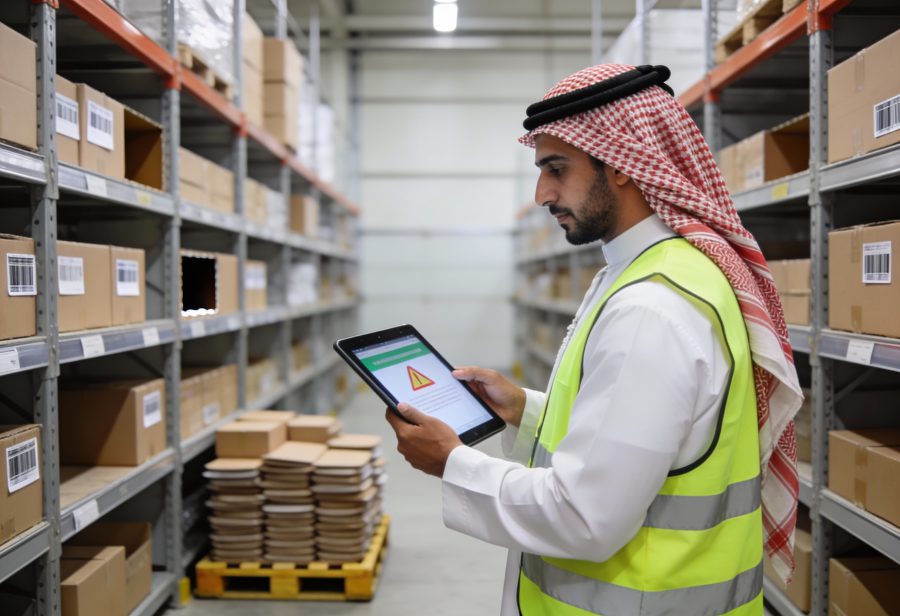

A major function outsourced to a 3PL and 4PL vendor is inventory control. When this is compromised, several business outcomes are negatively impacted:
- Inefficient stocking: With a lack of clarity about inventory, there is a danger of overstocking it. Unsold inventory is a waste of raw materials and occupies expensive warehouse space.
- Order delivery issues: If a 3PL vendor fails to deliver on the inventory control and reporting front, your company will experience issues in receiving and picking orders. Plus, a warehouse that is full of unsold goods is likely to fall into a disorganized mess, leading to difficulties in shipping orders in a timely manner. This ultimately leads to unhappy customers and lost business.
- Stock level discrepancies: The lack of transparency will also make it impossible to determine when supply levels at warehouses need replenishing and lost products will be difficult to track. Low inventory can also impact a company’s ability to deliver their products on time and on target, negatively impacting their reputation and, again, potentially resulting in lost business.
As such issues mar the efficiency of the inventory control, costs will rise and customer service suffers. To retain unhappy customers, the business may need to implement measures like expedited shipping, which will increase your transportation budget unnecessarily.
5) You suffer losses in the form of frequently damaged inventory
A telltale sign of an inadequate 3PL and 4PL vendor is the inability to manage a warehouse effectively. There are inventory horror stories circulating throughout the kingdom, indicating that not all 3PL and 4PL companies are quality conscious, which ultimately results in damaged and wasted stock.
There are some key areas of warehouse management where poor 3PL and 4PL vendors are lacking:
- Process improvements: A good partner would be vigilant about identifying process improvements at your company’s warehouse, like minimizing direct handling of goods and manual tracking, ensuring proper labeling, and timely storage of incoming and outgoing goods. All of these processes contribute to the safety of the stock in the warehouse. A poor vendor is fairly lax about these practices, which translates into losses at the warehouse.
- Material handling equipment: A good vendor would also see the value of investing in material handling equipment where it is necessary. Equipment like pallet jacks, pallet inverters, hoists, and conveyor belts require heavy initial investment as well as costs associated with maintenance and future modifications.
- Shelving and racking: A good 3PL and 4PL vendor would scrutinize the racking system at warehouses, ensuring that their design suits the type of stock, and that protection is added where necessary, as well as monitor other warehouse design factors, such as overhead lighting. While the costs of such upgrades would deter a poor vendor, a high-quality service provider would see a long-term return on investment.
- Packing protocols: A good vendor will make sure that proper packing protocols are implemented at the warehouse. When freight is improperly packaged, there is a higher risk of damage during shipment. It is also becoming increasingly difficult to claim damages as carriers do not accept liability for improper packaging.
- Staff management: A good vendor will ensure that warehouse personnel is regularly trained and is held to a reasonable work schedule that is not likely to bring about exhaustion or burnout. Failure to do this would result in workplace accidents, which can also damage stock.
6) Your reputation for delivery timelines gets damaged
One of the costliest outcomes of a poor 3PL and 4PL partnership is damage to your company’s reputation. All it takes is a couple of botched deliveries for customers to lose trust in your company. Winning customers back not only takes up managers’ time and energy but also requires a budget allotment, especially if you’re continuing to work with the same vendor.
In this scenario, as you cannot rely on your inventory reporting, your company will need to arrange for additional safety stock to mitigate the risk of any further issues in-order delivery. Some estimates say that companies have to add up to 50 percent more for backup, which requires increased storage space and raises inventory costs.
7) Employee turnover increases at warehouses


Some businesses may feel forced into needing to hire an inventory planner to supplement the 3PL and 4PL company’s operations with an internal employee to bring efficiency into the vendor’s management. However, this shouldn’t be the case with a competent vendor, unless agreed upon at the outset.
This haphazard management also threatens employee satisfaction at the warehouse, as the staff is more likely to quit due to a lack of clear direction and a frustrating work environment.
8) You will lack the necessary technological support
It is necessary to determine the long-term vision of a 3PL and 4PL vendor before engaging them. A vendor that regularly invests in research and development and keeps its operations at par with technological advancements will be able to support your company’s future growth as well.
These include transparency-enhancing software that provides real-time data and tracking facilities that help optimize costs and automated systems that reduce human error. These companies recognize that adopting the latest software and technology into the supply chain offers significant advantages to them and their clients.
An inadequate 3PL company will not have its eye on the bigger picture and keep your company’s growth mired in the status quo. In contrast, your rival businesses may be exploiting the advantages that come with a logistics partner that is committed to optimizing the supply chain at every point in time.
Knowing what can go wrong using a poor 3PL and 4PL vendor can be the difference between a successful and unsuccessful logistics operation. Those looking to connect with a leading 3PL and 4PL provider, in order to set up a sophisticated supply chain, using the latest operations technology, should get in touch with SBT to see how we can add value to your operations. Click here to arrange a consultation.


State-owned Saudi Railway Company (SAR) plans projects to enhance transport and logistic services in KSA
In line with Vision 2030, Saudi Arabia continues developing its logistics industry with the aim of achieving economic growth by both strengthening its own domestic supply chain capabilities and transforming into a major international logistic hub that leads the region in the sector.
SAR has planned significant rail projects that will enhance Saudi Arabia’s logistics reputation whilst substantially expanding capabilities across the country, starting with:
1. A 40-kilometer-long line connecting the North-South Railway and the Riyadh-Dammam Network.
This new project will link the existing North-South Railway, which runs from the Northern Province, passing through Al-Jawf and Hail, and reaches Al Baithah Junction in Qassim Province, and the Riyadh-Dammam network, which is a 449-km passenger line, with four stations, connecting the Eastern Province’s capital city with the Saudi capital.
The track is estimated to cost SR 600 million (USD 160 million) and will carry both passengers and heavy freight. This double-tracked, non-electrified line will run along the eastern perimeter of Riyadh, between the Riyadh terminus of the North-South Railway and the capital’s main passenger station on the Riyadh-Dammam line.
The new line is expected to have:
- A total axle load of 32.4 tons
- Passenger train speeds of up to 200 km/h
- General freight speeds of up to 120 km/h
- Heavy freight speeds of up 80 km/h
It’s estimated it will take between three and four years for the project to be completed and will have a substantial impact on local and international logistics.
2. A 200-kilometer long line linking Yanbu and King Abdullah Port at King Abdullah Economic City.
The well-publicized megacity will contain six strategic areas including an industrial zone, a seaport, residential areas, a sea resort, an educational zone, and a central business district. Similar to the other line, it too will be non-electrified with an axle load of 32.4 tons.
It is estimated that the line will carry up to 100,000 passengers a year. The costs of this particular construction are understood to be in the range of SR 2 billion up to SR 6 billion, with an estimated timeline of four and five years for completion.
Saudi Arabia continues to be on track to create a diverse rail infrastructure, which is not only part of a national push, but a GCC-wide ramp-up of improvement, accessibility, and efficiency of transportation networks.
For more information on how a third-party logistics provider can help facilitate your business’s supply chain management through Saudi Arabia, get in touch with SBT by clicking here.
Summary
In today’s increasingly digitized world, expectations from businesses are at an all-time high. Customers want same-day shipping, return policies that prioritize their needs, and high quality of personalized service. Failure to deliver on any of these points, and will take their business to a rival company that provides them with the facilities they want. Supply chains around the world are transitioning to faster and more innovative models by the day, and every company is judged by rapidly rising standards.
In this fast-changing and intensely competitive market, the challenge businesses face is that of becoming (and remaining) agile. Customer-demand levels tend to fluctuate, while supply issues also occur. Businesses need to handle both factors without negatively impacting overall service. Supply chains around the world are transitioning to ensure they can fulfill your business’s needs.
This is where third-party logistics come in to help support businesses with the smooth movement of goods and services. Given a 3PL and 4PL’s industry-specific expertise, these vendors are able to offer seamless supply chain services regardless of market conditions, while giving access to facilities, infrastructure, and know-how that may otherwise remain unavailable for businesses.
If your company also decides to embrace the rising trend of outsourced supply chain management, there are a number of factors to consider before partnering with a 3PL or a 4PL provider. As each business is unique, a qualified vendor should be ready to tailor their supply chain solutions to your exact business needs and objectives.
Index
- Does the Provider Have the Capabilities You Need to Meet Your Objectives?
- Is Their Network Large Enough to Efficiently and Effectively Satisfy Your Logistics Requirements?
- What Kind of Customer Support Does The Provider Offer?
- Does the Provider Have Experience Working With Your Industry?
- Is the Provider Financially Sound?
- Does the Provider Have a Reputation For Flexibility and Agility?
- Have the Provider’s Services Been Certified?
- Is the Provider Technologically Advanced Enough to Offer Total Transparency?
- What is the Provider’s Ideal Client?
9 Questions You Need to Ask About Your Supply Chain and Logistics Services Provider
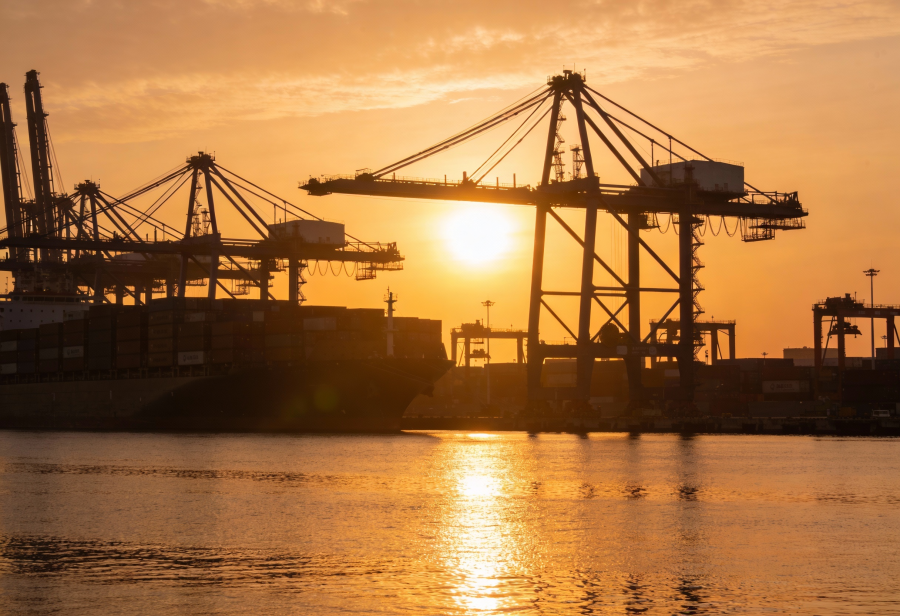

A New Supply Chain Trend: Outsourcing
In order to maintain customer satisfaction, outsourcing has advanced as a solution for optimizing the efficiency of many businesses’ supply chains.
Saving time and money
Companies are coming to the realization that inhouse management of the supply chain can be both inefficient and costly, given the fact that business managers are responsible for multiple outcomes and their generalist approach may not be best suited for this aspect of operations.
In contrast, an external supply chain and logistics management vendor offers specialized services that can quickly adapt to industry developments.
They are able to efficiently see a company’s products through development to consumer phases, which can include such distribution activities as:
- Domestic transportation
- Warehousing
- Freight forwarding


Industry expertise
Given their industry-specific expertise, these vendors are able to offer seamless supply chain services, regardless of market conditions. At the same time, outsourcing services give access to facilities, infrastructure, and know-how that may otherwise remain unavailable for businesses.
Thus, companies stand to benefit from increased efficiency and lower costs, which in turn gives businesses increased economies of scale, which can be transformed into a competitive edge over their market rivals.
Choosing Your Service Provider


Outsourcing supply chain management has emerged as a major trend in 2020. The latest research by Gartner Inc. indicated that a large majority of supply chain managers (85%) had forecast an increase in outsourcing in 2020. A significant amount of that budget will be allocated for hiring a third-party logistics provider (3PL) or a fourth-party logistics provider (4PL).
When you make the right choice of a supply chain management partner, it translates into a smooth and fruitful long-term solution for your company’s logistics. Businesses should consider it a direct investment in their future success.
If your company also decides to embrace the rising outsourced supply chain management trend, there are a number of factors to consider before partnering with a 3PL or a 4PL provider.
An external vendor should not be merely considered as a quick fix for ongoing supply chain issues. In order for businesses to reap the maximum benefits of engaging an external vendor, it is important that the hired supply chain management partner is a good fit for a company.
Scrutinizing their offering
Unfortunately, there is no secret formula to supply chain success. However, by scrutinizing the right aspects of potential vendors’ operations, you can mitigate risk and set the stage for a potentially mutually beneficial partnership.
Below is a breakdown of the questions your company should ask before hiring a supply chain and logistics services provider.
1) Does the Provider Have the Capabilities You Need to Meet Your Objectives?
Where are the gaps?
By partnering with the right vendor, your company will obtain access to highly specialized knowledge and expertise, which will go a long way in streamlining your supply chain. But before beginning the search for a 3PL or a 4PL provider, companies need to determine their exact requirements for an effective supply chain.
It is recommended that you establish a cross-functional team, drawn from the following departments:
- IT
- Distribution
- Logistics
- Customer service
The executive management should also collectively share their opinions on the gaps in your company’s supply chain. After arriving at a more comprehensive understanding of your current challenges, you can match them to your business goals to get a fuller picture of what you expect from your partnership with a 3PL or a 4PL provider.
After doing that, you can begin your hunt. With a sophisticated understanding of your requirements, you can now determine whether a prospective vendor has the capacity to meet your exact needs and if they are a good fit for your company.
2) Is Their Network Large Enough to Efficiently and Effectively Satisfy Your Logistics Requirements?
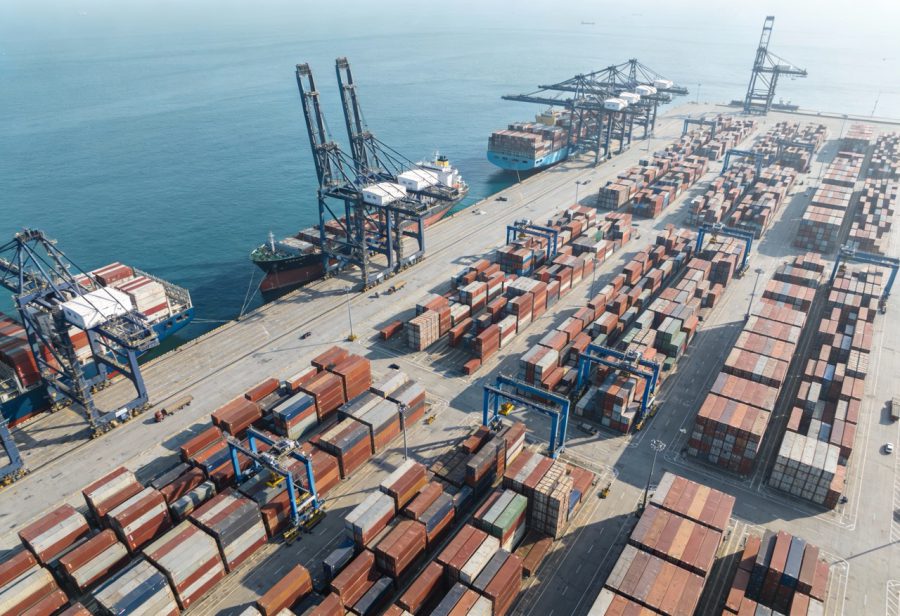

When considering partnering with a third-party supply chain vendor, two of the obvious factors to keep in mind are its location and contacts. In order for the partnership to work, the vendor must operate in the regions where you have demand and a wide range of contacts to call on for your business.
Room for growth
A worthwhile logistics company’s network of contacts should be geographically diverse enough for your business’s future growth. Because you should think long-term when partnering with a logistics vendor, it’s advisable to consider the regions where your business may expand. Determine whether you’ll require logistical support and then analyze if a prospective supply chain partner will be able to deliver in those areas.
If not, then that company is not a good fit, as you will need to engage an additional second vendor for other geographic locations. Doing so will generate unnecessary paperwork and coordination that can be easily avoided.
International logistics
In the case of international logistics, your vendor should be able to exhibit a cultural understanding of how business is done in those target locations. Work ethic, business rules, and legal requirements vary across countries and even different cities within the same country. Familiarity with these cultural nuances is an essential aspect of your ideal logistics partner’s knowledge base.
Remember if your logistics partners run afoul of international legal requirements, your company may be held accountable as well!
3) What Kind of Customer Support Does The Provider Offer?
In the fast-paced world of business, a company wants its problems addressed and questions answered on a priority basis. When a vendor is not able to deliver on that front, it can make for a very frustrating partnership and be the cause for broken agreements.
When researching options, it’s, therefore, worth the effort to inquire about the customer support offered by a vendor.
If they have outsourced it, you are likely to be stuck having long phone conversations with a person who may not even be familiar with your business environment and market conditions. Add to that the nuisance of different business hours and the potential language barrier, and you’ll quickly see that this vendor is not a good fit for your company.


In contrast, a vendor that mobilizes a support team on your first call and promises rapid resolutions of any supply chain issues is a worthwhile partner for your business.
This vendor should also appear ready to consider your feedback when fine-tuning their service offerings in the future. It shows that they are motivated to win your business and will strive hard to retain your company as its customer.
4) Does the Provider Have Experience Working With Your Industry?
When reviewing the portfolio of prospective logistical partners, consider what kind of industry experience is demonstrated by their customer profiles.
Of course, the basic requirements are:
- Sufficient company size to meet your demands
- Previously served other companies in your industry
- Knowledge and capacity to deal with industry-specific demands
A good choice of logistics partner will have previously catered to businesses with your order volume and larger, to accommodate for your business’s future growth. A portfolio consisting of several large clients shows that the vendor has the capacity to run the business.


5) Is the Provider Financially Sound?
It is not uncommon for business partnerships to begin in good faith and, later, suffer due to poor revenue models. Before taking on a 3PL or 4PL partner, examine their financial background thoroughly.
Consider the kind of information that will give you a good sense of their financial acumen and ask for it early during negotiations. A basic set of financial documents can include cash-on-hand, outstanding debts, disaster recovery plans, sourcing areas, costs, and customer concentrations.
If a company is not forthcoming with its financial information, that is a major red flag.
6) Does the Provider Have a Reputation For Flexibility and Agility?
Supply chain and logistics vendors tend to market themselves based on industry expertise; however, it’s important to remember that there are key differences in operations even while there are similarities in pricing and distribution strategies within an industry. Each business is unique, and a qualified vendor will be ready to tailor their supply chain solutions to your exact business needs and objectives.
Moreover, the right vendor will also mold their offerings to suit the ongoing business processes at your company.
An overhaul of the complex operational systems in a business to accommodate the entry of a new logistics vendor would be an impractical and costly mistake. A vendor who is motivated to earn your business will deliver the necessary functionality and require minimal changes later on.
For this to happen, the vendor must operate using the same or greater level of technical expertise as your company.
Finally, with an increased emphasis on agile development in business these days, the vendor should also have an informed game plan for how they intend to achieve more with less and how to share those savings.
7) Have the Provider’s Services Been Certified?


Another important factor is the quality of the services rendered by external supply chain vendors. In order to determine whether their practices conform to industry standards, ask to see their ISO (or similar) certifications. This allows you to independently verify their quality of work without relying too heavily on customer testimonials or their own presentations.
ISO 9001 is one of the relevant quality management systems certifications, which attests to the provider’s compliance with regulations related to your business, as well as requirements related to quality planning, order review, and resource management.
While certifications only serve as a mark of baseline competence, they are a guarantee that the vendor’s business is standing on strong foundational practices.
8) Is the Provider Technologically Advanced Enough to Offer Total Transparency?


Modern-day logistics has gone digital and that means your company’s supply chain data can (and should be) at your fingertips. This kind of transparency is non-negotiable in this day and age.
When hiring a 3PL or 4PL provider for your company, it’s a good idea to determine whether they will be able to give your company real-time information. A good service would provide a fully synchronized solution that gives its clients immediate and accurate updates about the location of goods at all times.
Moreover, they would offer buyers access to:
- Purchasing history
- Sales demands
- Marketing budgets
- Inventory availability
- Quotations and product development requirements
Each of these empowers customers to make quick and cost-effective buying decisions, while forecasting and budgeting those accurately.
9) What is the Provider’s Ideal Client?
Finally, consider the vendor’s own company size. A vendor may be ticking quite a few of your own boxes but remember that they’re running a business too, and may screen clients based on whether they fit their own criteria.
Is your operation big enough?
Large logistics companies expect to work with high-volume manufacturers who do business on a global scale.
They may take on smaller clients, but may not offer the same quality of service, so you may find higher satisfaction with a smaller vendor that is motivated to do a good job for your company. Still, you’d have to make sure their portfolio demonstrates enough experience to handle your business.
By completing a thorough screening process when searching for your 3PL and 4PL provider, ensure your company goes into business with a logistics partner that takes your company’s productivity, profits, and reputation to the next level. To see if SBT is the right fit for your business, get in touch with us here to arrange a consultation.


With 27 airports – five of which are international, 10 regional, and 13 domestic – the Kingdom of Saudi Arabia is connected to more than 81 airports in 45 countries.
In today’s piece, we look specifically at the KFIA, built-in 1990, and serving as the third major aviation and cargo hub in the Kingdom.
Expanding Capacity and Going Green
KFIA, based in Dammam, is the largest city in the Eastern Province, and the fifth largest in Saudi Arabia, after Riyadh, Jeddah, Mecca, and Medina. The city is growing at an exceptionally high rate of 12% per year. Neighboring Al Khobar, which is home to Aramco and many Western companies, also use the KFIA for the movement of goods and air cargo.
The airport, the largest in the world according to the Guinness Book of World Records, serves 43 destinations, with 10+ million passengers passing through per year. It’s expected to expand its capacity to 21 million passengers in the near future.
And taking passengers to and from the airport will be the new hybrid Hyundai Sonata, with Hyundai supplying 1000 units of its new model, which is being hailed as a more modern and eco-friendly approach. This new fleet of green taxis will operate at airports around KSA.
Air Cargo Through KFIA
Recently, Saudi Arabia ranked #62 on the World Bank’s Ease of Doing Business report, jumping significantly due to improvements in the time and cost involved in exporting and importing goods. Currently, the infrastructure allows for more than 1.2 million tons of cargo to be moved around the world. The country’s objective is to increase total air cargo capacity in the Kingdom from an approximated million tons a year to 6 million tons per year in 2030.
KFIA will play an important role in helping the country achieve this goal. The cargo village is over 5,400,000 sq. ft. and offers ease of shipping and cargo services. Working as a hub for global companies, it directly serving the Eastern Province and the rest of the Kingdom. Setting up the cargo village also gives businesses direct access to Saudi Arabia, and eliminates the need to ship through neighboring countries.
Air Cargo Highlights
- With a fully-automated system constructed over 425,000 sq. ft. and equipped with multi-level racks and a container stacking system, the cargo facilities at KFIA can function at a capacity of 176,000 tons a year.
- The introduction of a second new cargo facility, still under construction and expected to be completed sometime this year, will result in enhanced services, options, and a further increased air cargo capacity of up to 150,000 tons annually.
- The new terminal also incorporates a dedicated cold-chain facility to meet the growing needs of the pharmaceutical and food industries to ship high-value, temperature-sensitive goods.
For more information on how a third-party logistics provider can help facilitate your business’s supply chain management through KFIA and the Kingdom as a whole, get in touch with SBT by clicking here.
In today’s increasingly global economy, businesses look outward, beyond the borders of their country of origin, to grow their customer base. This international expansion may promise big dividends but it’s far from straightforward to execute. Before a business can begin its exports, it must navigate through the complicated customs laws and the associated red tape from each country it wishes to engage with.
For most businesses, handling this cumbersome process internally is a daunting task. Not only is it extremely resource-intensive, involving the purchase of technology licensing, hiring of knowledgeable personnel, and a heavy increase in the logistics budget, but it also presents completely new territory for managers, making the margin for error unacceptably high. It also diverts their focus from the everyday operations of their business, which could negatively performance.
Many would agree that a more shrewd investment is to hire a freight forwarding company, who specializes in handling the logistics of exports and imports for other businesses.
Let’s take a closer look at the services offered by a forwarder:
What is a freight forwarding company?
Import/export mechanisms are murky and often leave business owners mystified. However, the opportunity to trade overseas is too lucrative to pass over. Cargo forwarding companies help bridge the gap between businesses and their potential clients abroad by taking complete ownership of the storage and shipping processes.
Sea forwarding companies boast expertise in the customs laws and commercial regulations surrounding imports and exports. They are well versed in the trade routes leading to and from the countries in which they operate. And they have numerous contracts in transportation services, ranging from air and sea cargo services to rail and road fleet operators.
These resources allow forwarding companies to offer clients highly customized shipping solutions, that take into account the nature of the shipments and their intended destination. It matches a business’s specific requirements in terms of speed, affordability, and reliability with an ideal trade route for its shipments, and ensures that its goods will safely reach its international clients on schedule.
Typical Services Offered by freight forwarders
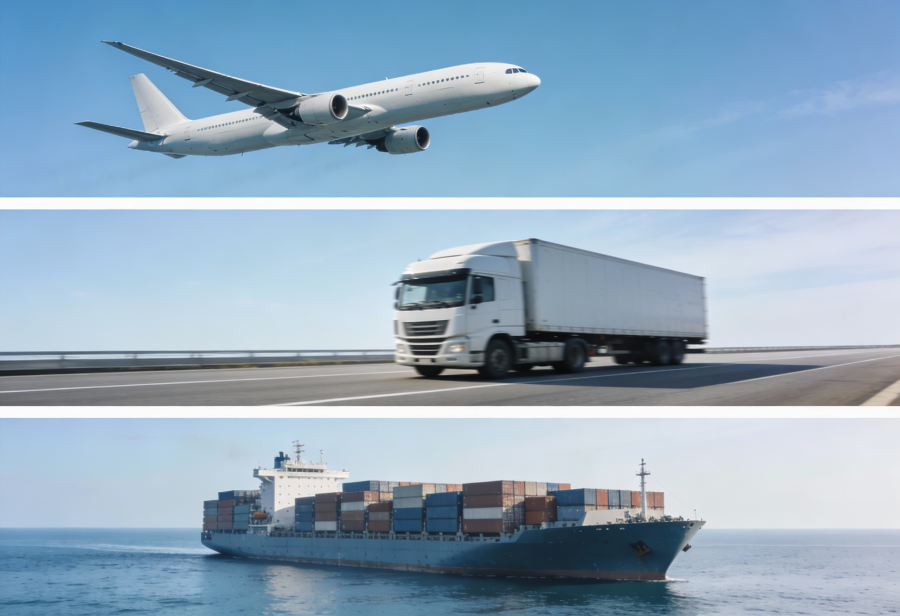

The inherent premise of a forwarder’s service is that it will allow its client to trade internationally, without its staff having to do any of the legwork. That means it takes care of all the documentation and correspondence with transportation services, customs officials, and other handlers. This typically takes the form of a multi-phase process spanning multiple locations.
It begins with the export haulage stage, where goods are transferred from the client to the forwarder’s warehouse. At this point, forwarders offer several value-added services, including packaging and labeling, according to customs regulations.
Packaging
Cargo forwarders take care of the specialized packaging requirements for goods being shipped overseas.
Contrary to the relatively simpler packaging requirements of local goods transport, many more factors have to be taken into consideration when packaging goods for international travel. Depending on the nature of the product and its final destination, this task can have varying levels of complexity.
To illustrate, a package going overseas will go along an extended trade route, where it will be loaded and unloaded multiple times. This increases the chances of damage due to mishandling and measures have to be taken at the time of packaging to ensure that it can withstand a robust journey.
Similarly, items that are being transported via cargo ships or air may experience volatile weather conditions and need extra insulation to prevent possible damage due to impacts with other shipment or container walls. Palletizing the goods and using other safeguards such as straps, seals and stretch wrapping can also protect shipments during transport.
Packages must also withstand extreme temperatures, which is often the environment in which they are stored during shipping. Another consideration during air travel is the weight. Items being expedited by air travel have to be packaged using lighter-weight materials to economize shipping costs.
Labeling
In order to track packages and meet customs regulations, all export packages must be appropriately labeled before they are shipped. Lost labels and mislabeled cargo result in delays, loss of customer confidence, and damage to a business’s reputation. When a business engages a freight forwarder, one of the procedures it outsources is this labeling protocol.
The labels generally include the following essential information: a list of all the products being shipped; a declaration of any hazardous items, the shipment’s country of origin and weight, port of entry details, and any details that are mandatory to provide in the destination country’s language.
In addition to this labeling process, forwarding companies also possess expertise in effectively handling all the complex documentation that is involved in import/export operations. They oversee the export customs clearance phase, in which the goods receive clearance to leave their country of origin, the origin handling phase, where cargo is unloaded, inspected, and checked against the booking documents and the import customs clearance, where customs paperwork is scrutinized.
Documents typically handled by forwarding companies include a bill of landing, which is a contract between the business and the carrier, a Commercial Invoice, which is the bill for goods stating their value, often used to assess the amount of customs duty owed, an inspection certificate to confirm that the quality of goods was vetted by official authorities, an export license to prove that the export was authorized by the government, a certificate of origin that states where the package comes from, and an export packing list, which details each item in the shipment, the type of packaging used, and the package’s weight and measurements.
After all of these processes have taken place, the goods are shipped. The forwarding company then supervises the destination handling phase, in which the goods are transferred to the import warehouse upon reaching the destination country. Finally, in the import haulage phase, the goods are taken from the import warehouse to the end consumer.
Benefits of freight forwarding
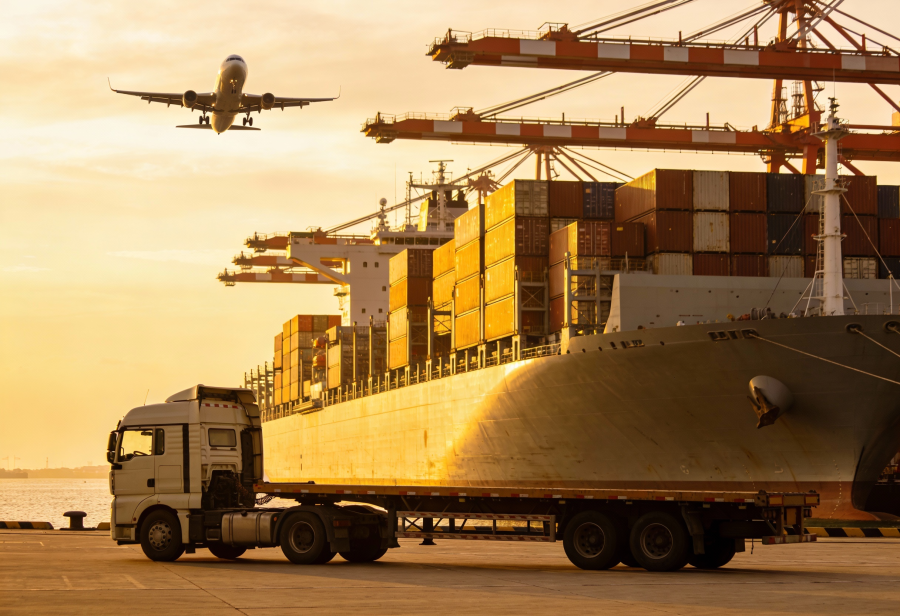

Freight forwarders specialize in cutting costs and facilitating the logistics of transportation. By simplifying imports and exports for businesses, forwarding companies allow their customers to gain a competitive advantage in the industry.
Below is a more specific breakdown of benefits offered by forwarding companies:
Affordability
As forwarding companies handle a high volume of shipments and have developed relationships with various carriers, they have access to discounted rates for shipping and related services, which they can pass on to their customers.
This economic advantage is compounded when forwarders negotiate with multiple service providers on behalf of their clients and sift through a range of bids to select the most affordable trade route for their shipments.
At times, forwarders can take multiple shipments when the trade routes for multiple clients align. This further brings down costs for their clients.
A simple, single contract
For most businesses’ export needs, their shipments are likely to be handled by multiple cargo services, ranging from trucking companies, to ocean liners, to air cargo companies. When independently managing its exports, a company would have to individually enter into contracts with each of these service providers, which would require a considerable investment of time and administrative effort. However, a forwarding company saves you from this hassle, handling all the contractual work on their end while you only enter into a single contract with the forwarder.
Trust with the experts
Given that import/exports is likely to be unfamiliar territory for manager lacking experience in the area, managing international trade operations within a company’s existing structure would be extremely challenging.
When a business outsources the tedious and time-consuming paperwork and correspondence to a forwarding, its managers are confident that experts are following due processes and making informed decisions on their behalf.
Even as the particulars of their export operations are handled remotely, managers are kept in the loop and are always in control of their shipments.
Agility
In international trade, there are days when there are more elements out of your control than within it. From ever-changing geopolitical scenarios to unexpected weather conditions, a number of critical situations can thwart your business plan and schedule.
While a regular business manager may be unable to handle rerouted shipments or carrier delays, a forwarding company would possess the resources, knowledge, and contacts to handle the situation with minimal losses for both business and consumer.
How to choose a sea freight forwarding company for your business



A forwarding company is essentially the logistics partner of a business. For export operations to run smoothly, it is important for the relationship between the forwarder and company managers to be amicable and expectations to be clear on both sides.
When bringing a forwarder on board, a business should consider a number of key factors before entrusting their business to their professional care.
1. Assess the business needs
Before a company partners with a forwarding company, it must know exactly what its business’s transportation needs are.
This initial assessment should cover the kind of cargo services the business wants to use and its expected volume of shipping.
Once these needs have been evaluated, the company will be in a better position to evaluate the specific type of forwarding company that will fulfill its business requirements.
2. Examine the prospective profiles
When examining pitches from prospective freight forwarders, a company should consider the kind of industry experience and reach demonstrated by each bidder.
Even forwarding companies develop niches and can specialize in catering to specific industries. If they lack experience in a certain business’s market, they may not have the expertise needed to meet its needs.
The forwarding company should also be able to demonstrate its strategic reach. They must be able to handle regular correspondence with both a business’s customers and its manufacturing units.
3. Evaluate risk management strategies
An efficient forwarder who cares about its client’s profits will be proactive in mitigating the risks posed to its international business. Exports and imports are vulnerable to unstable conditions such as inclement weather and geopolitical tension, which can cause delays, reroutes, or a loss of goods.
By proactively planning for such conditions, a forwarding company can solve issues as they occur and minimize damages. Moreover, a competent forwarder should be able to provide a cargo insurance solution to its clients, without which the risk of shipping goods overseas is prohibitively high.
4. Confirm the range of services
Businesses should clearly and comprehensively communicate their expected needs to prospective forwarding companies and confirm that bidders will be able to fulfill all aspects of their supply chain.
In most cases, businesses require shipments to travel via a range of transportation services, including air cargo, sea freight, road, and rail transport. When engaging a forwarder, it is worthwhile to ensure that it would be able to facilitate multimodal transportation. At times, businesses also require warehousing services and a full-service forwarder should have access to them. If forwarders offer a limited range of services or have only local reach, a business can quickly outgrow the partnership, which will prove to be a poor investment in the long run. It is better to begin a long-term relationship with a versatile forwarder than have several one-off engagements.
It is also recommended to check how a forwarder communicates with its clients. Online tracking systems, instantaneous updates, and regular check-ins are some of the ways forwarding companies keep their clients informed about the status of their shipments. Businesses should ensure that possible forwarders are eager to provide detailed quotes, answer questions, convey issues, and handle concerns.
5. Check licenses
In order for forwarders to legally handle commercial cargo, they must have the updated permits or the purpose. Some products are sensitive and require special licensing. Before taking on a forwarder, businesses should ensure that they have all the appropriate licenses.
SBT offers a range of freight forwarding and other logistics services. Get in touch to learn how we can assist your business at every stage of the supply chain.
In an increasingly globalized world, a logistics company should use best practices in logistics services to connect markets and drive customer confidence
Logistics services refer to the comprehensive supervision of a product or service, from its origin to final point of delivery, meeting the specific requirements of the customer and corporation, at both ends of a business supply chain. This involves a complex operation of processes, which includes multiple parties. The organization and implementation of logistics services are best handled by a logistics company.
What is a logistics company?
A logistics company is a specialized organization that manages, plans, implements, and controls the efficient, forward, and reverse flow and storage of goods. It also follows information related to a commodity from a point of origin to a point of consumption. The cargo managed by a logistics services provider may include tangible goods such as materials, equipment, and supplies, as well as food and other consumable items. The processes within a logistics and shipping company include the integration of information flow, special equipment, and training of personnel handling particular materials, client-specific packaging, detailed inventory, transportation, warehousing, and security.
What is the role of logistics?
A professional logistics company provides the smooth support and movement of commodities across a supply chain. Warehouses, distribution centers, storage hubs, delivery stations, and the air, land, and sea freight facilities supporting the movement of goods, all fall within the realm of logistics.
When someone thinks of logistics, the easiest way to explain the depth and dimension of the word is to visualize the e-commerce giant Amazon. Considered one of the Big Four technology companies along with Google, Apple, and Facebook, industry gurus estimate that Amazon provides logistics services for about 12% of business-to-consumer shipments worldwide. To serve its customers, Amazon has built an enormous network of warehouses and distribution centers, with over 850 facilities across 22 countries, occupying 220 million square feet! This kind of efficient logistics and distribution system plays a huge role in the success of Amazon.
What are key logistics services?
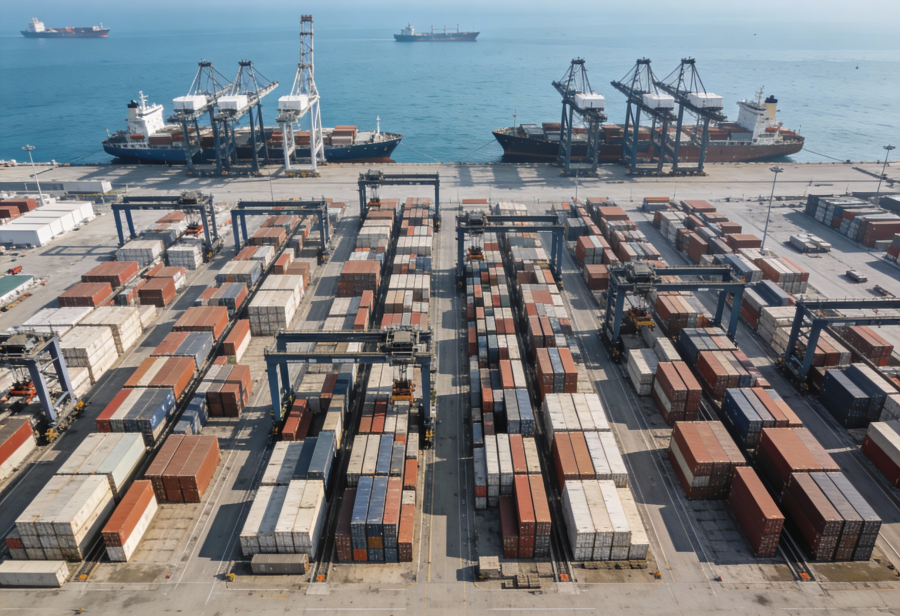

A successful business is one that sells products, that are not only in demand but also find their way easily to customers. In today’s highly digitalized world, where a lot of items are sold online, goods still need to be moved from a point of origin (vendor) to a final destination (customer) through physical transport. This process of moving things from Point A to Point B, usually through shipping companies, is the arena of logistics. As organizations expand, they outgrow a person-to-person sales model, with multiple factors influencing the way products are moved. This is where logistics services providers come in. They specialize in managing the shipping processes for businesses, coordinating things so that products end up where they need to be in as efficient a manner as possible.
For a logistics services provider, the processes involved in the management of goods, from origin to end source, form the chain of movement. These include the following:
Inventory Management:
A professional logistics company manages its inventory to deliver optimized storage of goods and materials for multiple customers. With digitalized technology looking at inventory in real-time, logistics companies are now able to deliver customizable solutions to clients.
Warehousing:
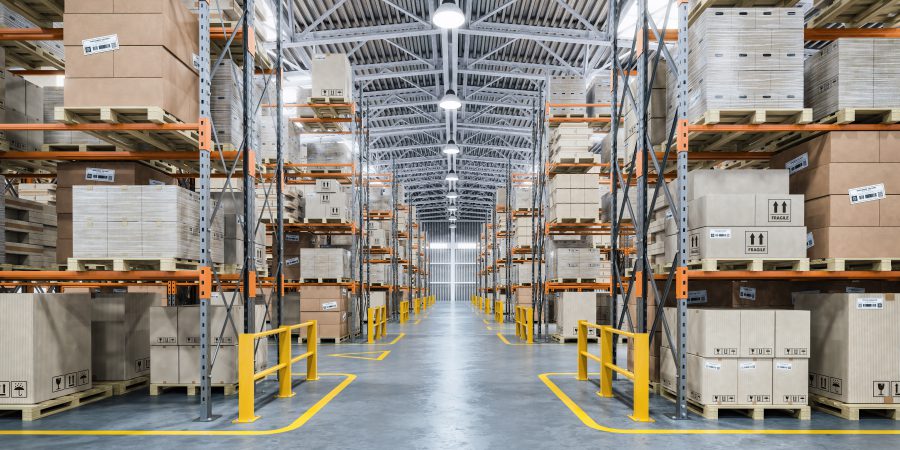

The warehouse is the central nervous system managing the flow and storage of commodities within a logistics company. It acts as the control room and is the true test of a transportation company’s mettle. Factors like location, number, size, layout, and design play a huge role in how the movement and logistics of customer goods are managed.
Supporting Transport and Freight Services:
Transport, including freight services, is what keeps the customer supply chain moving smoothly without hiccups. The physical transfer of goods, from picking them at source, deciding on the best method of shipping along with the transport infrastructure, to its final destination, is the professional area of expertise for an experienced logistics company. Transportation of commodities can be tricky, especially if the routes by land, air, or sea are prone to weather disruptions, political upheavals, or security issues. A professional logistics company oversees the coordination of transportation services to deliver on a maximum utilization of space, strategically routing and timing multiple client consignments to ensure that there are no delays.
Handling of Goods:
A professional logistics company ensures the proper handling of goods through trained personnel and the use of the correct supporting infrastructure. The introduction of digitalization and automation to the handling of goods has added to logistical productivity. To go back to the example of Amazon, the company has long used robots to help move merchandise around warehouses. Equally, the introduction of Systems Applications and Products (SAP) in data processing for warehouses, inventory management, and handling of goods has increased the volume, speed, and level of service through which a logistics company now transports cargo.
Packaging:
Logistical or industrial packaging is different from the product packaging directed by market trends and consumer behavior. A logistics company provides packaging that guarantees minimal damage to commodities during material handling and movement. Understanding merchandise and how it needs to be packed, handled, and transported is a very important part of the movement of goods.
Integrated Information Systems:
A logistics company employs information systems that play a crucial role in delivering efficient logistics services to customers. Information technology tools are constantly used to identify, access, store, analyze and retrieve information on goods. A logistics company will work regionally, as well as across international state lines. Logistics services providers now use technology to help manage the movement of goods in the most optimal way. Integrated software helps professionals in the field determine best routes, as well as deal with complications as they arise.
Logistics management best practices
Logistics management, or logistics services management, often confused with supply chain management (SCM) is actually a subset of the latter. SCM includes inter-enterprise, multi-functional processes that target everything from the supplier’s inbound freight to the end consumer. Logistics management is the more practical, hands-on part of the supply chain where goods are transported into a facility, properly stored, handled, and transported out.
Logistics management, or logistics services management, plays a significant role in the success of any company’s operations and has a direct impact on its bottom line.
Logistics Strategy:
A fine-tuned logistics strategy, helps a logistics company make quick, informed decisions that can save clients up to 40% on logistics costs. As the supply chain is constantly changing, so are logistics processes involved in the movement of clients’ goods. Using developed and implementable formal logistics strategies add flexibility to the decision-making process and increase the error-response time. Equally, professional logistics companies are adept at predicting disruptions and responses, ensuring that logistics services and support to a client’s supply chain stay at peak performance.
Having a business’s logistics functions and its overall supply chain cycle assessed by a logistics company, helps a business determine the best transport solutions.
Some client-specific questions that a logistics company will consider include:
- What are the benefits of handling a client’s diverse kinds of consignments differently – such as, expedited shipping versus slower-moving cargo?
- When should items be inventoried and when should they be forwarded directly to an end customer?
- What role can a shipping company play in the transportation and distribution network of a business’s goods, and how can it be improved for more expedient and efficient transfer of products.
- Does a change of carrier, or a particular mode of transport save money, or improve service, for a client in outbound transportation?
- How much client inventory should a logistics company carry at a given time to be functioning at an optimal level?
- What are the specific customer-oriented goals? Speed? Safety?
For every business, there are different logistics needs and different ways to evaluate operational success. A static logistics strategy will cause serious harm to a business’s service and its bottom line.
While the logistics environment changes frequently, and the amount of data available for analysis grows, logistics service providers and shipping companies actively strategize in order to stay ahead of the fluctuations to avoid disorder within a business’s supply chain. A professional logistics provider, therefore, is always asking questions about logistics processes, evaluating successes and inefficiencies, and altering logistics management strategies to fit clients’ changing needs.
An efficient logistics services company regularly analyzes its inbound and outbound logistics management, while taking into consideration vendor compliance programs. Equally, a successful freight company always has practical and implementable reverse logistics in place, so that in the event of a return on goods, the movement of products does not impact the client’s supply chain management or bottom line.
Third-party logistics companies
Businesses need to take a strategic approach to collaboration and outsourcing with third-party logistics (3PL) companies if they want to grow and expand. 3PLs offer improved customer service and more effective procedures. Working closely with a 3PL allows the logistics provider to see a client’s challenges and opportunities from every possible angle.
The year 2018 saw a huge growth in third-party logistics services providers within the United States. The two main factors driving this growth were an unusual buildup in inventory on imported products as domestic suppliers fought import tariffs. This, along with tight domestic-carrier capacity drove up rates and increased fuel surcharge revenue. As businesses were faced with tough measures, they increasingly turned to 3PL companies to move goods.
Regionally within the Middle East as well, as businesses tighten their belt to ride shrinking economies to their end, there has been an increase in 3PLs to help businesses effectively coordinate within their supply chain. An example can be seen in the auto industry where a reduction in domestic motor-carrier capacity is seeing growth within the more mature, 3PL asset-heavy, dedicated contract-carriage segment.
Advantages and disadvantages of working with 3pls



At some point within the growth cycle of a business, it will have too much on its plate. Printing labels, finding correct postage, and managing inventories is a complicated task, in addition to the production of a good. That is why any small-to-medium-sized operation looking to grow its client base, will at some point or the other, need to go the way of third-party logistics support. This will help a business scale its shipping-fulfillment process while focusing on the core strengths of its business.
Advantages:
Market’s today favor companies that focus on their strengths, devoting as much of their time and resources to product development. Outsourcing shipping and warehousing solutions to 3PLs, therefore, allows even smaller boutique operations to have a national, regional, or international reach, that is easily scalable to meet market demands.
Some of the benefits of using 3PLs include the following:
- Reach new markets through an easier movement of goods. Experienced 3PL logistics providers already have existing relationships. They can facilitate introductions in a new market, where a smaller business is looking to grow, making the transition easier.
- Take advantage of an existing logistics infrastructure and an experienced logistics mover who is up to speed on national, regional, and international tariffs, laws, and regulations.
- Utilize economies of scale by rapidly scaling to demand, by piggybacking off a 3PLs logistical and warehousing support. Additionally, as 3PLs service other clients as well, it saves business money on every stage of the logistics chain.
- Benefit from reduced transport costs. Using a 3PL logistics provider allows businesses to skip the costly trial-and-error process involved in growing, as well as, the significant investment of time and resources required to build a shipping and fulfillment network.
- Gain a turnkey customer-service and returns system. Some 3PL logistics providers also offer other services in addition to shipping, which can allow a business to focus even more on its core strengths.
The only disadvantage of outsourcing to a 3PL is the loss of control a business may feel over the movement of its products. However, with a professional and trustworthy logistics company on board, a business can be confident that its products are in the safest hands.
There are many third-party logistics providers to choose from today, so a business is advised to explore all available options before making a decision. While the price is an important factor to consider, it is a good idea for businesses to look at the size, reach, and maturity of a 3PL, as well as at the other services (if any) that they can offer. Perhaps the most important factor to consider is whether a 3PL is trustworthy and capable, as they are likely to be default partners in the success of a business.
For more information on logistics solutions and logistics-partnering options, get in touch or click here.
Saudi Arabia’s Vision 2030 looks to take advantage of its strategic geographic position by investing in key logistics projects across the country. Having already invested heavily in the country’s infrastructure, including ports, railways, roads, and airports, Saudi continues to work towards taking full advantage of international private sector partnerships to create a transport and logistics hub in the region.
This week we explore four key logistic projects in the region.
Jeddah Islamic Port
Work is underway to build new terminals at the Jeddah Islamic Port in order to accommodate the world’s largest container ships. The upgraded port is expected to attract trade from nearby countries and help transform Saudi Arabia into an essential logistics partner in the Middle East.
The cost of turning Jeddah Islamic Port into a regional trade hub is USD 2.4 billion. Additionally, by 2030, Saudi Arabia wants 70% of port development to be handled by private companies.
Riyadh Bus Service
Riyadh is getting a new bus service. The Abdulaziz Bus Public Transport Network has been scheduled to kick off in Q2 2020. The Riyadh Metro will link together the rapidly expanding city, in accordance with Vision 2030’s goal of improving transportation for the city’s burgeoning population.
Oman’s New Road Projects
Oman will boost its trade ties with KSA. The Wadi Saa-Hafeet dual road and Ibri bypass road will connect Saudi Arabia and Oman, boosting land connectivity and trade potential between the neighboring countries.
Riyadh Mega Cargo Tunnel
The Saudi government has given the green light to a mega cargo terminal in Riyadh. The proposed terminal will span across 60,000 square meters and be capable of handling 600,000 tons of cargo a year. The first phase of construction is expected to be completed by mid-2022.
For more information on how a third-party logistics provider can help facilitate your business’s supply chain management across the Kingdom and the region, get in touch with SBT by clicking here.
